The story of an entrepreneurship that positively impacts the environment.
In the Dominican mountains, blessed by nature with ideal conditions for cultivating various crops for much of the year, paradoxically, the richness of their ecosystems competes with the
poverty of their inhabitants, due to their limited access to basic services, lack of road infrastructure, and the challenges they face to survive.
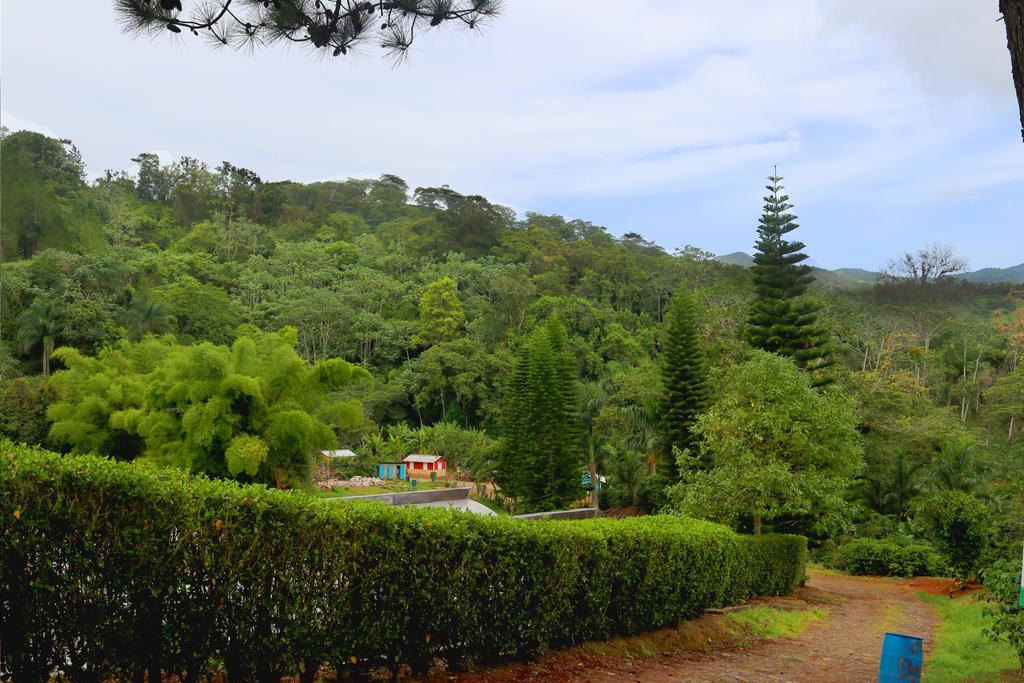
Rancho Arriba, Dominican Republic. Source: BPP
At the top of one of these mountains, located in Rancho Arriba, San José de Ocoa, we find Mr. Atilano Báez, an organic coffee producer, who tells us that before having his own farm, he
worked for 20 years in a coffee company.
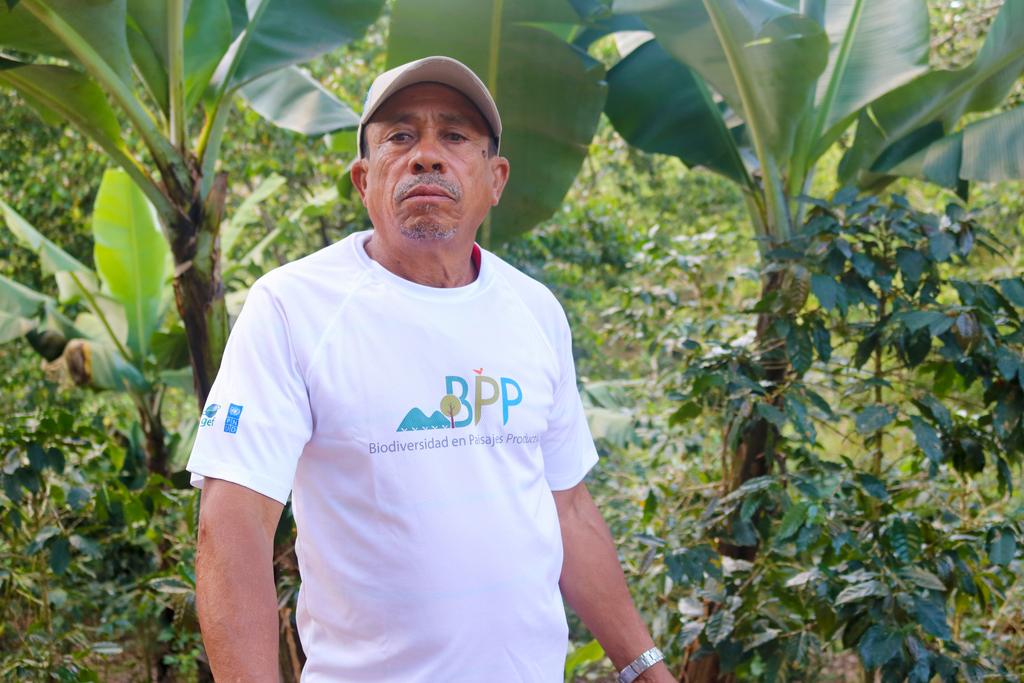
“Before, I used to work in a
truck loading blocks by
hand, a very labor-intensive
job. Then, I worked for 20
years at Coffee Samir.
There, I learned many things
about coffee production,
and now I have my own
farm.”;
Francisco Atilano Báez, coffee
producer. Source: BPP
Francisco Atilano Báez, productor de café. Fuente BPP
The Dominican Republic is one of the countries in the Caribbean region with the highest coffee production. According to estimates from the Ministry of Agriculture, in
2018, the cultivated area for coffee was close to 75,000 hectares, with a production of 18,400 metric tons. It was also estimated that around 28,000 producers were involved in this activity.
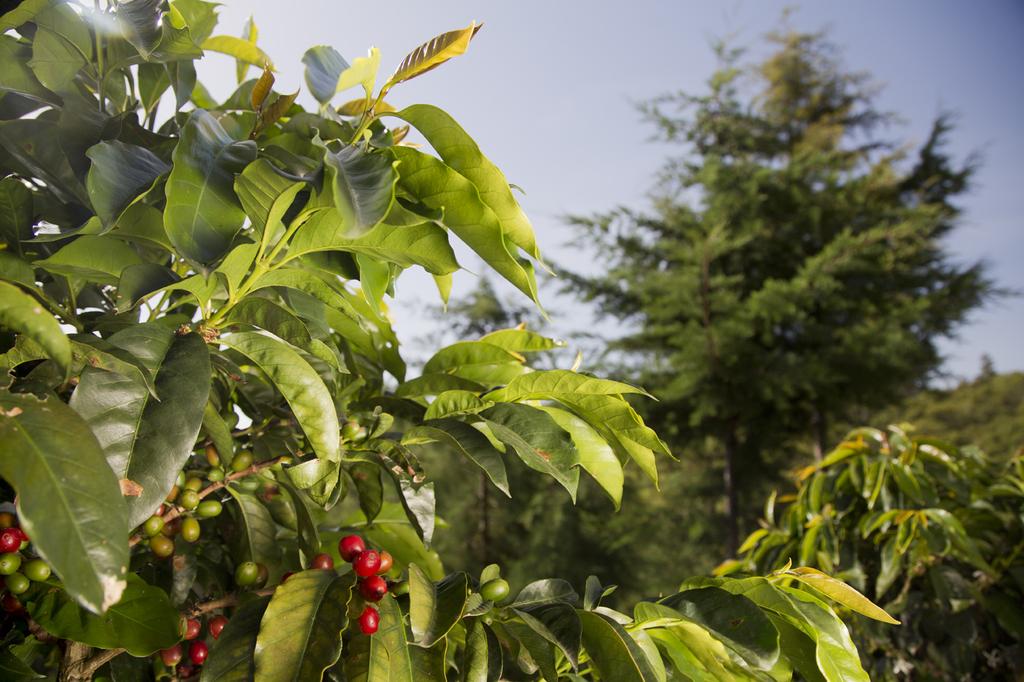
Coffee plant. Source: BPP
Dominican coffee is renowned for its high quality and good prices in international markets. It is the primary crop in mountainous regions and is predominantly cultivated by small-scale producers who rely on coffee as their main source of income. In fact, it is the main economic activity in the locality where Atilano Báez lives, which is located to the west of the “Montaña La Humeadora” National Park.

"Producer of coffee plants in a private nursery. Source: BPP"
The premise of a dream
Around 13 years ago, Atilano bought 3 hectares of land with the dream of dedicating himself independently to coffee production and thus increasing his income. This was something he achieved despite physical limitations due to health issues.
“I have health problems; I have 5 herniated discs. I taught other people to do the work I used to do, and I made the decision to start my own venture. At first, it was difficult to get used to managing my own budget. I used to receive a fixed salary every 30 days, but then I got used to it, and now I don”t need a salary because the farm provides me with more economic benefits,” says Atilano Báez.
Atilano Báez
Working alongside Atilano is his wife, Grey Casado, who shares the challenges they have had to overcome to move forward and how both of them work together to improve their production and achieve their goals.
We have 3 children, but they live in Santo Domingo City, so, you know, with Atilano´s health issues, I am always a hundred percent on the farm. Both of us plant
the coffee and bananas and everything else, and then we also do the harvesting, says Grey Casado, wife of Atilano Báez.

Atilano and Grey at their home. Source: BPP
Grey Casado explains how she and her husband work together on the farm, taking care of tasks like planting coffee and bananas, and also handling the harvesting process. Their dedication and collaboration are evident as they strive to make their dream of successful coffee production a reality.
Gray Casado, wife of Atilano Báez
In the country, there are initiatives promoted by various institutions that encourage sustainable farming practices while improving the living conditions of the producers. One such initiative is the Biodiversity in Productive Landscapes (Biodiversidad en Paisajes Productivos, BPP) project, implemented by the Ministry of Environment in collaboration with the United Nations Development Programme (UNDP) and funded by the Global Environment Facility (GEF). The project focuses on promoting sustainable forest management and conserving biodiversity in threatened mountain landscapes.
For small-scale producers like Atilano, this initiative represents a significant boost for the sustainable management of their productive systems. Through the transfer of knowledge, tools, credit, and technical assistance, they can transform their plots into models of productive efficiency and conservation of ecosystem goods and services. The BPP project aims to support farmers in achieving a balance between agricultural productivity and environmental conservation, contributing to both the well-being of the producers and the preservation of biodiversity in the region.
Crises that make us reinvent ourselves
Over the last decade, coffee plantations have been affected both by the severity of the coffee leaf rust fungus (Hemileia vastatrix) and the threat of climate change, impacting
productivity and forcing coffee growers to renew their plantations by planting varieties resistant to this devastating pest (IDIAF, 2013). One of the most significant crises occurred in the year 2015, where production levels decreased from 836,650 quintals in 2009 to only 218,000 quintals, which is equivalent to a 74%.

Coffee rust. Photo taken from the internet
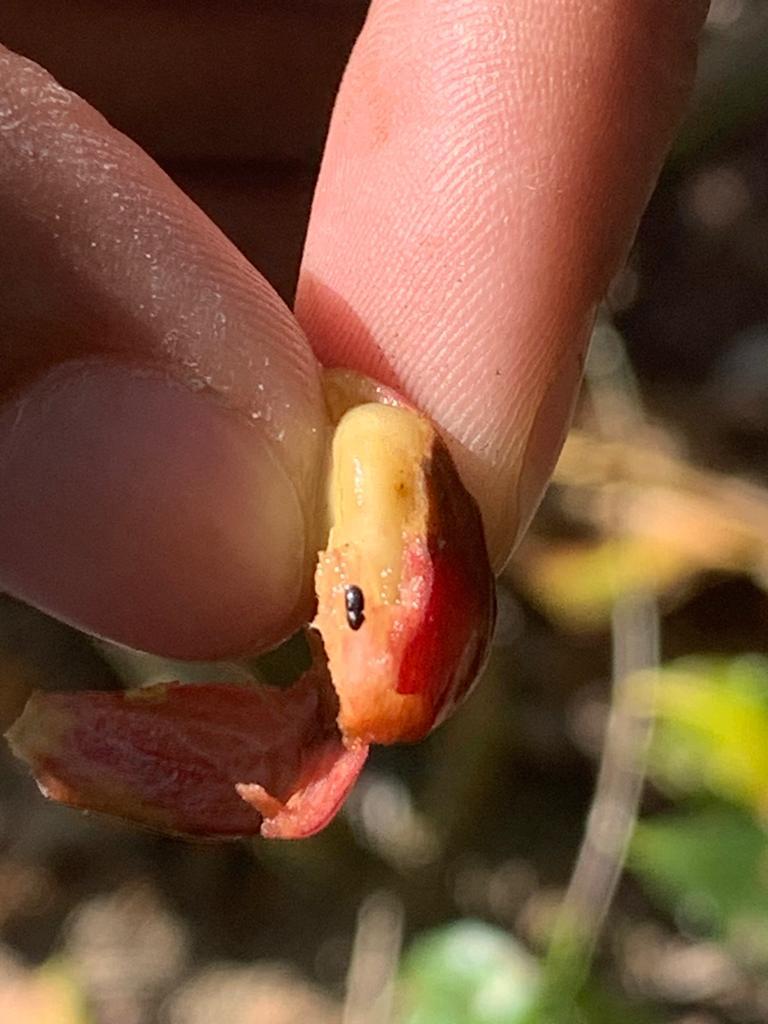
Coffee drill. Source: BPP
During the time that has passed since Atilano started his own coffee production, it hasn't all been rosy. Atilano tells us that in the early years, he had old plants and
caturra coffee, which got infected with coffee leaf rust, a devastating situation due to significant losses and meager economic benefits from the production. For the past 4 years, he and his wife have been working with the support of a technician from the Dominican Coffee Institute (INDOCAFE). They have planted new coffee varieties resistant to coffee leaf rust, and as a result, things are going better for them now.
Training is vital to achieve good results
Atilano has attended all the training sessions provided by INDOCAFE under the BPP project and puts into practice on his farm all the sustainable production techniques he has learned in the field schools. These techniques include crop diversification, shade and pruning management, organic fertilization, methods for pest and disease control, redesigning agroforestry systems, and post-harvest management. Additionally, he receives weekly visits from the technician to supervise the implementation of these best practices.

I have been working in the coffee sector in the Mahoma area, Arroyo Manteca, for over 15 years. Atilano has been one of the coffee growers who always adopts all the methodologies and technologies suggested to him. He takes on every recommendation and suggestion from the technical team. He is a very methodical producer, and his farm serves as a model for all the producers in the area. We have introduced a series of technologies on his farm, such as pest and disease management, and handmade trapsfor controlling the coffee berry borer. In terms of soil conservation, we have built diversion
trenches or channels and used debris and waste from shade control to create barriers. We have maintained a sustainable agroforestry system. When coffee is not in production, he
grows other crops on his farm that he can market to maintain the economy.
Daneris Méndez, INDOCAFE technician.
With these good practices he has implemented on his farm, Atilano has successfully redesigned his plantation and expanded the area dedicated to production, aiming to increase productivity while also promoting the conservation of biodiversity, water, and soil.
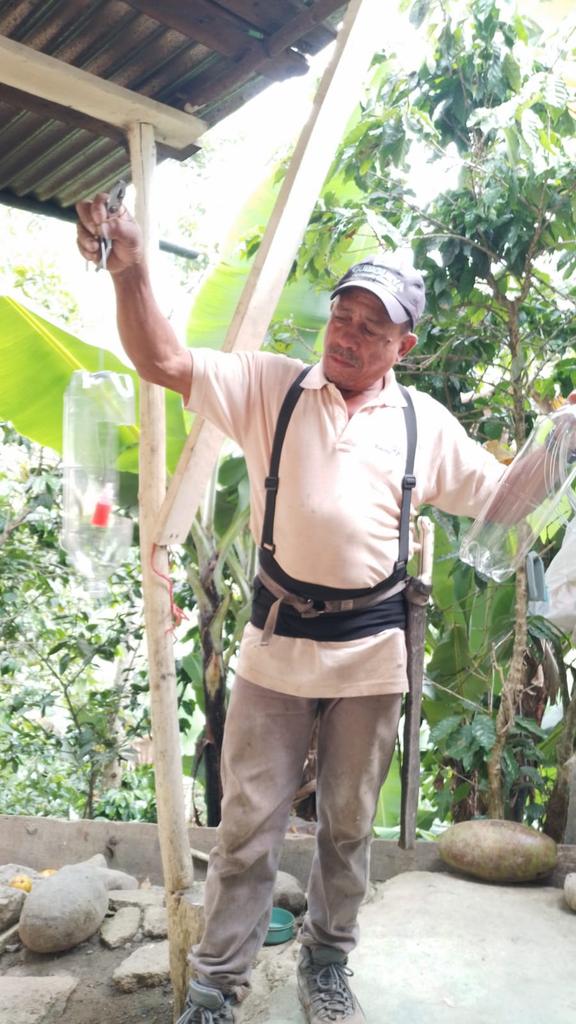

Atilano reuses plastic bottles to prepare traps for controlling the coffee berry borer. Source: BPP
By adopting sustainable techniques, such as agroforestry, pest and disease management, and soil conservation measures, Atilano has not only improved the productivity of his coffee farm
but also contributed to the preservation of the surrounding ecosystem. His efforts demonstrate the potential for balancing agricultural production with environmental conservation, highlighting the positive impact that responsible farming practices can have on both livelihoods and the natural environment.
Improving their living conditions while protecting the environment
In addition to the economic benefits of sustainable coffee production in the lives of these farmers and their families, there are numerous environmental benefits that arise from these
practices.
Through sustainable coffee production, Atilano has planted other crops that help boost his economy, such as bananas, avocados, citrus fruits (lemons, oranges), as well as timber species and other shade trees like Guama, a tree commonly used in coffee and cacao plantations for shading.
Ecologically, this species aids in soil recovery as it fixes nitrogen, and its leaves provide additional nutrients when they decompose. Moreover, it helps reduce erosion and conserve moisture.
By diversifying his crops and implementing sustainable farming techniques, Atilano is not only enhancing his income but also contributing to the restoration and protection of the
environment. These efforts have a positive impact on soil health, biodiversity, and overall ecosystem stability, reflecting a responsible and holistic approach to agricultural practices.

Source: BPP
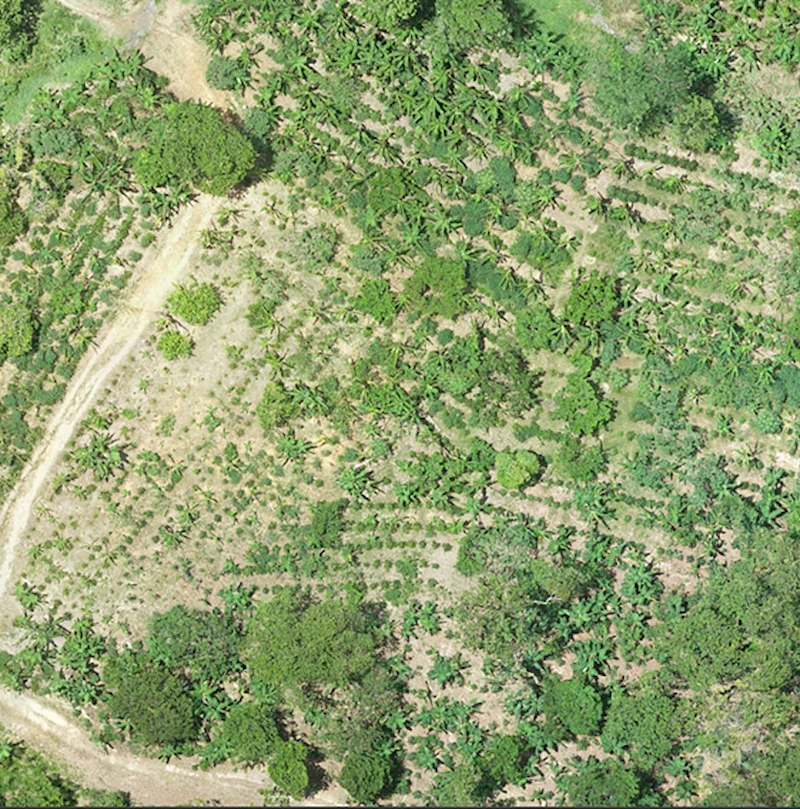
Images of Atilano´s farm in June 2022 (left) and May 2023 (right) show improvements in planting layouts, proper shade management, and pruning, as well as an expansion of the area dedicated to the agroforestry system. It is estimated that within 3 to 5 years, this entire area will experience increased forest coverage and soil protection, while also making the marketing of crops associated with production profitable.
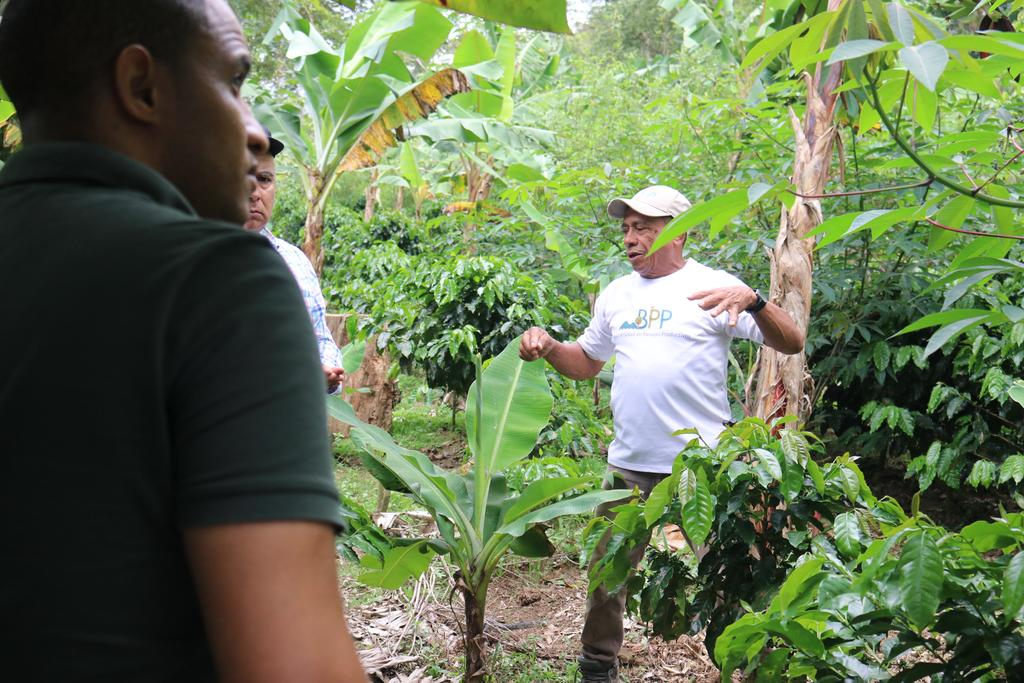
Atilano showcases his agroforestry system. Source: BPP
Atilano continues working towards becoming a successful producer, and he has hope that with this production system, his income will increase, eventually leading to a better quality of life for him and his family.
Now things are better for us; we have a little ranch in Ocoa, and with what we earn from our production, we have been gradually improving. Theres still some work to do, like plastering, and we have plans to do that work and make it more comfortable.
Currently, like Atilano, there are over 400 producers in the municipality of Rancho Arriba who are willing to work on improving their farming practices, increasing their income while contributing to the conservation of soil, water, forests, and biodiversity.
The dedication of Atilano and other farmers in the region reflects the positive impact that sustainable agriculture practices can have on both livelihoods and the environment. As they continue to work towards better production methods and economic opportunities, they are also contributing to the preservation of natural
resources and biodiversity, making a valuable contribution to the overall sustainability of the coffee industry in their region.
